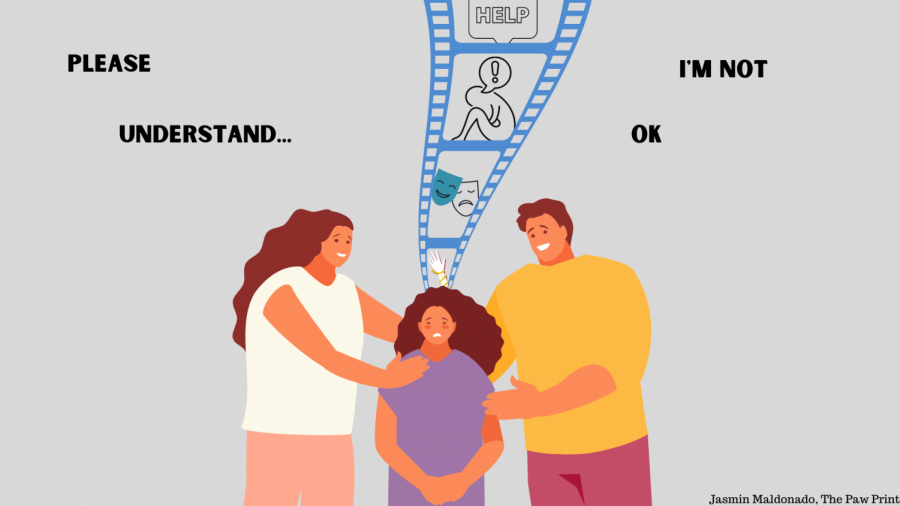Parents’ survival mindset completely disregards mental health issues
Mental health issues have been quite ignored and pushed off to the side by many parents of color because their life consisted of one thing: survival. They had to endure harsh obstacles like violence, racism, lack of financial stability, starvation, gangs, and much more. It was clear that they had a really tough life, so providing their children with a house, food, education, and daily necessities would surely steer them away from the same difficult lifestyle— wrong.
The basic necessities that parents are responsible for providing do not guarantee that their children will not develop mental health issues. Just because teens nowadays have everything that their parents did not, it doesn’t mean that they are going to live happily ever after.
Teens have to deal with the constant reminder that school is only going to get harder, that they will soon have to juggle between a job and college, and that they will have to face the outside world without a clue of what being an adult means.
However, parents fail to comprehend this as they don’t see how this could possibly be unbearable. Instead, they tend to compare their problems to their children as if that would make things any better. Thus, leading to a lack of parental support and a long line of never-ending mental issues on their children.
“Every time I tried to talk to my mom about [my mental health], the conversation would steer toward how I had nothing to be depressed about,” said Sara, a teacher at junior high school in an interview with Vice. “We are an upper-middle-class family. My upbringing was cushy and sheltered compared to her own, so she’s not completely wrong, but we only know our own realities.”
Unfortunately, there are a lot of parents who feel the same way because of their close minded outlook towards the various problematic roots of mental health issues.
In a study conducted by the National Center for Biotechnology Information, it was found that various ethnic backgrounds had almost the same beliefs regarding the causes of mental issues. In particular, Latinos believed that dealing with family issues, losing a loved one, and moving to a different location was what caused these issues. African-Americans had similar beliefs, except they thought that stress was the major contributing factor, and Asian-Americans included cultural differences and medical illness as another factor. Overall, the three ethnic groups agreed on family issues being one of the major causes behind mental illnesses.
This shows that it’s not until something tragic or complex happens that parents are open to the idea that their children might be suffering from mental health issues.
On the contrary, this is because historically many parents had to turn their full attention to sustaining themselves at a fairly young age. According to the United Nations Economic Commission for Latin American and the Carribean, 40% to 70% of students drop out before finishing primary school. The main reason behind this is due to prolonged poverty within each household, which ultimately leads to passing up the opportunity to receive an education because working becomes the priority.
Therefore, most parents do not prioritize and take the time to learn about their kids’ mental health because their generation did not have the various opportunities that many adolescents have now. For them, having everything they lacked should be enough for their children because these factors are what prevented them from being happy and unsuccessful at a young age. However, the truth is that people like Sara and many other teens can dispute that there are many more underlying causes which parents fail to see.
In a viral TikTok, a young adult in frustration informs her mother that children’s mental health should be prioritized over school because it’s an additional factor that contributes to the downfall of students. She provides an example of kids committing suicide due to hiding their emotions for the sake of their parents beliefs. Her mother shows her refusal to accept her daughters point of view and continues her argument right before the TikTok cuts off.
Many TikTok users proceeded to express their thoughts in the comments as they too related to the main point of the video.
“As a minority, I can say most of our parents don’t believe in mental illness,” said one of the 13.2k users under the comments. “It’s sad. I feel like we’re set up for failure…”
Since parents show this lack of enthusiasm towards mental health issues, many teens and young adults lamentably do not receive the help that they need. Statistics show that there are 24.6 million adults with mental illnesses and another 1.8 million teens with depression who haven’t received any treatment.
Furthermore, because many teens already know that their parents or other family members do not believe in mental health issues, they refuse to open up about it.
“I would not feel comfortable to talk about certain topics with them such as my mental health,” said junior Emely Aguilar. “I have several family members that do not believe in mental health being important. They do not like the way this generation is being raised, and it’s ridiculous because they should listen to us, even though we are still kids in their eyes.”
Invalidating our children’s feelings like this is a massive issue as 6.8 million African Americans, 8.9 million Latin Americans and 2.2 million Asian Americans all suffer from mental illnesses.
“They would be able to help a lot more if they understood mental health,” claimed Aguilar. “I feel like they would give the best advice ever if they didn’t deny how we feel.”
In the end, it is undeniable that parents will most likely not know about mental health and its importance because they are from an entire different generation. Nevertheless, leading teens to suppress their emotions, depriving them of parental support, and refusing to hear them out is not acceptable because ultimately all a child longs for is the ability for their parents to understand them. If parents just took the time out of their day to try and sympathize with their kids, the future of their child’s mental health would have a much more positive outlook.
Your donation will support the student journalists of Parkdale High School. Your contribution will allow us to cover our annual website hosting costs and publish some printed editions, as well.

She is currently a junior in high school and this is her first year on staff. Her articles are often about topics that many teens can relate to because...







